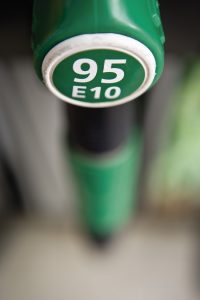AFPM proposes octane standard to replace US ethanol mandate
Al Greenwood
13-Apr-2018
HOUSTON (ICIS)–The head of the American Fuel & Petrochemical Manufacturers (AFPM) proposed on Friday that the US should consider moving away from an ethanol-blending standard and phasing in one that sets a minimum octane rating for gasoline.
 Unleaded ’95
E10′ is 95 octane gasoline containing 10%
ethanol. (Photo by PhotoAlto/REX/Shutterstock)
Unleaded ’95
E10′ is 95 octane gasoline containing 10%
ethanol. (Photo by PhotoAlto/REX/Shutterstock)
That standard could require US gasoline to have a 95-RON octane rating, said Chet Thompson, CEO of the AFPM. He made his comments before the US House Energy and Commerce Subcommittee on the Environment.
Such a rule would be more flexible since it would allow companies to meet the octane target with any blendstock, whether it comes from an oil refinery or an ethanol plant. Ethanol itself is a powerful octane booster.
Thompson’s proposal comes as US refiners struggle to meet the ethanol-blending requirement of the Renewable Fuel Standard (RFS).
The RFS required US gasoline to have ever-increasing amounts of ethanol. Refiners can satisfy the RFS mandate by blending ethanol into their gasoline or by purchasing credits, known as renewable identification numbers (RINs).
Recently, the volumes of ethanol blending called for by the RFS has collided with the limits of the US automobile fleet. Many vehicles are only approved to use gasoline blends containing 10% ethanol (E10). Anything past that level could void the warranty of the vehicle.
As average US blend rates approach this 10% level, refiners have increasingly relied on RINs to comply with the RFS. This has caused prices for RINs to rise rapidly.
“For most refiners, RFS compliance costs now dwarf many other expenses, threatening the long-term viability of many,” Thompson said.
One refiner, Philadelphia Energy Solutions (PES) went bankrupt and blamed its financial problems partly on RINs.
President Donald Trump had recently proposed allowing automobiles to consume blends of 15% ethanol (E15) year round. Right now, the fuel is restricted to the winter.
Under Thompson’s proposal, E15 would be among the several ways that refiners could meet an 95-RON octane standard.
“A 95-RON octane performance standard, if done correctly — with a sunset of the RFS, a reasonable phase-in and robust market competition — has the potential to benefit consumers and all stakeholders, compared to the status quo,” he said.
An octane standard would provide other benefits as well.
Automobile producers are relying on high-compression engines to meet fuel-efficiency standards, and these engines typically require higher octane fuels.
A fuel standard based on octane instead of ethanol could satisfy rising demand for higher octane fuels in the most cost-efficient manner.
“US fuel and transportation policy is at a crossroads,” Thompson said. “The auto industry faces enormous challenges in meeting increasing fuel efficiency targets, the refining industry is dealing with an expensive, inefficient and unworkable Renewable Fuel Standard, and fuel marketers and the biofuel industry are faced with constant uncertainty and never-ending debates about the RFS, making for a very challenging business environment.”
He added: “Although we believe this option has the most potential, we know that it would raise many challenges and require a significant investment for our industry, which is why it cannot be considered in addition to the RFS.”
Refineries make several products that can boost octane ratings for gasoline.
Catalytic reformers produce benzene, toluene and xylenes (BTX) in addition to other octane-boosting blendstocks.
Alkylation units produce octane-boosting products by reacting isobutane with propylene made in fluid catalytic cracking (FCC) units.
US regulations prohibit methyl tertiary butyl ether (MTBE).
Global News + ICIS Chemical Business (ICB)
See the full picture, with unlimited access to ICIS chemicals news across all markets and regions, plus ICB, the industry-leading magazine for the chemicals industry.
Contact us
Partnering with ICIS unlocks a vision of a future you can trust and achieve. We leverage our unrivalled network of industry experts to deliver a comprehensive market view based on independent and reliable data, insight and analytics.
Contact us to learn how we can support you as you transact today and plan for tomorrow.
READ MORE

